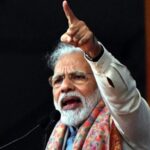Illustration: Liu Rui/GT
By Chen Hong
On June 26 the home of Shaoquett Moselmane, member of the Legislative Council of the New South Wales Parliament of Australia, was raided by the Australian police. This was conducted at the direction of the Australian Security Intelligence Organization (ASIO), Australia’s intelligence agency. Moselmane is said to be under investigation for his so-called links to an alleged “Chinese government interference plot.”
Evidence cited in the media includes an op-ed Moselmane wrote acknowledging China’s speedy and serious efforts to fight against COVID-19. In the article, he went on to denounce racist acts against Chinese and other Asians that had been taking place in Australia and elsewhere in a world that is “offensive and insulting”.
“The dregs of White Australianism from the past”, he wrote, “are resurfacing to bring about a resurgence of the Yellow Peril mythology”.
In a later piece published on his personal website, Moselmane was fully aware of the “mammoth task ahead” in the long-haul fight against the epidemic. He acknowledged that China has “fought it and contained it”.
Moselmane was first ousted from his parliament Assistant President office, and has now been suspended of his Labor Party membership after much abuse and assaults from right-wing politicians and media outlets.
Why has Moselmane become a scapegoat amidst widespread anti-China hysteria in Australia? What has China done to incur such fury and hostility from hawkish “panda-bashers” in Australia? China has demonstrated leadership as it has successfully brought the epidemic under control. What China has achieved to contain the outbreak and revive the economy has contributed to the international efforts to fight with the COVID-19.
What Moselmane voiced in his essays are not just compliments of China. He also mentioned the steadfast progress being made in other parts of the world.
That is obviously not acceptable for the anti-China politicians and media outlets down under. They have spared no effort to vilify and slam China at every chance. Some Australian media outlets have played a destructive role blaring rhetoric repeatedly that demonizes and stigmatizes China. Some media outlets even resorted to disinformation to stoke up the general public’s ill feelings toward Beijing.
What Moselmane wrote “the dregs of White Australianism from the past” was intentionally mistranslated by an Australian reporter as, “obsolete scums of white Australia” in order to stir up public hatred.
Moselmane’s criticism of resurgent xenophobia was misrepresented as being racist inference in itself. This goes against the basic ethics of journalism.
Over the previous three years, Australia’s Liberal-National Coalition government has been adopting an increasingly hawkish policy toward China. This has served the interests and strategies of the US to contain and suppress China’s development. In fact, since 2017 both the previous Malcolm Turnbull administration and the current Scott Morrison government began actively collaborating with Washington to contain Beijing. This involved a raft of unfair, unjust and destructive measures against cooperative agreements already established between Chinese and Australians. The bilateral relationship is now at its lowest ebb. This is to the detriment and interests of both countries.
Australia was among the loudest countries in the world to slander and vilify China’s response to the pandemic. At the behest of the current US administration, it called for a global inquiry of China with regard to the origin of the virus.
China is still Australia’s comprehensive strategic partner. As Australia’s biggest trade partner and biggest source of international students and tourists, China does not deserve such unfair and unwelcoming treatment.
Moselmane, a fair-minded politician, unfortunately fell prey to the anti-China hysteria in Australia. Such an inimical Cold War-style atmosphere has sadly agitated Australia – stemming from Washington’s McCarthyist witch hunts and toxic diplomacy.
The author is a professor and director of Australian Studies Center, East China Normal University. opinion@globaltimes.com.cn


